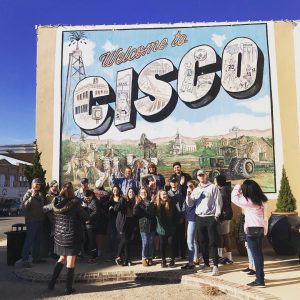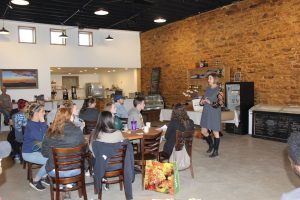
Business & Sustainability students take a tour of the newly revitalized Cisco Downtown.
In January, twenty-two students attended Dr. Sarah Easter’s Business & Sustainability course (MGMT 440), a one-week intensive class that educates students on the opportunities and challenges of developing more sustainable business strategies and practices, and to explore the changing role of business in society and in relation to the environment. “Typically in business, we focus on financial sustainability,” Dr. Easter explained. “We fail to consider the economic and social well-being aspects of sustainability, so this course looks at the impact businesses can have on the community and environment as well.” The course offers many different perspectives on sustainability, examining what that means for a variety of different companies, from large, global corporations to local, small businesses.
This was the third year that the course has been offered but the first year that Dr. Easter incorporated out-of-town field trips in addition to several guest speakers. The students spoke with Abilene business owners, several ACU professors from varying colleges, and with a panel of Cisco downtown business owners. Students took a tour around ACU with Corey Ruff, Associate Vice President of Operations, to understand the campus initiatives for sustainability on a deeper level. They also went to Disability Resources Inc., a residential community for individuals with intellectual disabilities.

Cisco mayor Tammy Douglas speaks to Business & Sustainability students.
The students spent half a day in Cisco, TX. They spoke with Joy and Kerry Hedges, the owners of Slowpoke Farms and Slowpoke Market Store. The Hedges made significant lifestyle changes for sustainability regarding the food and products they consumed and extended those values beyond their personal life to their farming methods and business practices. In September, they opened the Slowpoke Market Store, which students were able to visit. The Slowpoke Market Store is a part of the revitalization effort in the downtown Cisco area. Students interacted with a panel of other business owners in the downtown area that are also involved with the revitalization efforts and with Tammy Douglas, Cisco’s first female mayor. Douglas explained the importance of local resources and how they have incorporated sustainable practices in the changes occurring in Cisco and gave students a tour of the downtown area.
By the end of the class, students were able to recognize interactions between environmental, social, and economic decisions, understand the power of business to negatively or positively impact their surroundings, gained exposure to how a variety of different organizations and perspectives tackle today’s sustainability challenges, and became more aware of their own role when participating in personal and professional decisions related to sustainability. Marissa Hickson, a senior marketing major, said that “the most impactful thing I learned in the class was the importance of researching the background, goals, and values of the companies I support. We learned how to evaluate sustainability reports and determine whether or not a company’s values align with ours. I learned that a lot of companies that I have trusted in the past don’t actually operate in the most ethical ways! It’s great to be aware of this now so that I can be sure to support the companies who are actively working to make our world a better place.” The class will be offered next January, so students can ask your advisor about this offering.